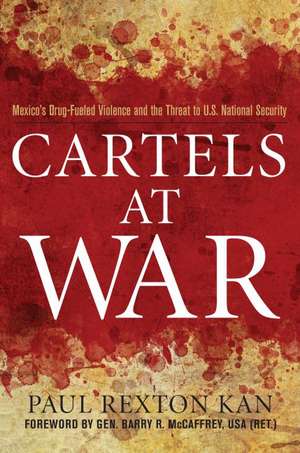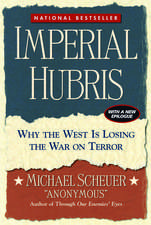Cartels at War: Mexico's Drug-Fueled Violence and the Threat to U.S. National Security
Autor Paul Rexton Kan, Gen. Barry R. McCaffreyen Limba Engleză Hardback – 30 sep 2012
Now in its sixth year, the conflict in Mexico is a mosaic of several wars occurring at once: cartels battle one another, cartels suffer violence within their own organizations, cartels fight against the Mexican state, cartels and gangs wage war against the Mexican people, and gangs combat gangs. The war has killed more than 60,000 people since President Felipe Calderón began cracking down on the cartels in December 2006. The targets of the violence have been wide ranging—from police officers to journalists, from clinics to discos.
Governments on either side of the U.S.- Mexican border have been unable to control the violence. The war has spilled over into American cities and affects domestic policy issues ranging from immigration to gun control, making the border the nexus of national security and public safety concerns.
Drawing on fieldwork along the border and interviews with officials at the Drug Enforcement Administration, the Office of National Drug Control Policy, the Department of Defense, U.S. Border Patrol, and Mexican military officers, Paul Rexton Kan argues that policy responses must be carefully calibrated to prevent stoking more cartel violence, to cut the incentives to smuggle drugs into the United States, and to stop the erosion of Mexican governmental capacity.
Governments on either side of the U.S.- Mexican border have been unable to control the violence. The war has spilled over into American cities and affects domestic policy issues ranging from immigration to gun control, making the border the nexus of national security and public safety concerns.
Drawing on fieldwork along the border and interviews with officials at the Drug Enforcement Administration, the Office of National Drug Control Policy, the Department of Defense, U.S. Border Patrol, and Mexican military officers, Paul Rexton Kan argues that policy responses must be carefully calibrated to prevent stoking more cartel violence, to cut the incentives to smuggle drugs into the United States, and to stop the erosion of Mexican governmental capacity.
Preț: 188.73 lei
Nou
Puncte Express: 283
Preț estimativ în valută:
36.11€ • 37.71$ • 29.82£
36.11€ • 37.71$ • 29.82£
Carte disponibilă
Livrare economică 25 martie-08 aprilie
Preluare comenzi: 021 569.72.76
Specificații
ISBN-13: 9781597977074
ISBN-10: 1597977071
Pagini: 208
Dimensiuni: 179 x 234 x 21 mm
Greutate: 0.45 kg
Ediția:New.
Editura: Potomac Books Inc
Colecția Potomac Books
Locul publicării:United States
ISBN-10: 1597977071
Pagini: 208
Dimensiuni: 179 x 234 x 21 mm
Greutate: 0.45 kg
Ediția:New.
Editura: Potomac Books Inc
Colecția Potomac Books
Locul publicării:United States
Recenzii
“Cartels at War is a masterful work. Paul Kan not only analyzes the phenomenon of high-intensity crime in Mexico, but he goes on to provide sound recommendations and policy responses. The geocriminality section of the book is brilliant, as are his discussions concerning Mexico’s possible futures, his perspective on the role of violent entrepreneurs, and the mosaic aspect of the war itself.”—Robert J. Bunker, instructor, Los Angeles High-Intensity Drug Trafficking Area, Office of National Drug Control Policy
“This highly incisive and compelling analysis of Mexican drug-trafficking violence provides an important counterweight to the many discussions of the subject characterized by hyperbole and hysteria. Paul Kan frames the issue in terms of high-intensity crime, a conception that goes well beyond oversimplistic labels such as narcoterrorism and criminal insurgency, and provides the basis for a valuable discussion of possible outcomes and a concise examination of strategic options for Mexico and the United States. The insights are many and valuable, the judgments judicious and mature, and the book is a must read for students of Mexican drug trafficking and violence.”—Phil Williams, Posvar Chair of International Security and director, Matthew B. Ridgway Center for International Security Studies, University of Pittsburgh









